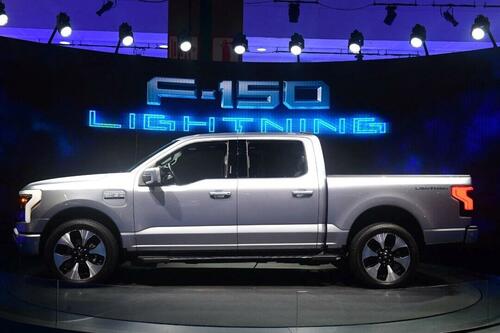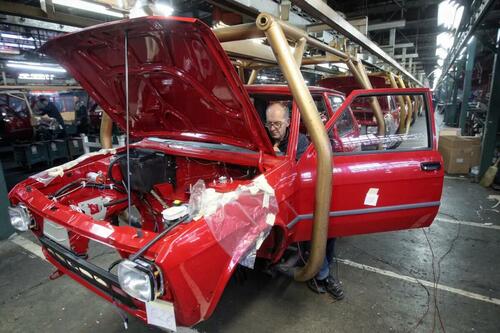Authored by John Seiler via The Epoch Times (emphasis ours),
So much for California’s mandate that “all new passenger cars, trucks, and SUVs sold in California will be zero-emission vehicles by 2035,” according to the California Air Resources Board. It imposed the mandate at the request of Gov. Gavin Newsom.

On April 24, Ford reported it lost $132,000 for each of its 10,000 electric vehicles sold in the first quarter of 2024, according to CNN. The sales were down 20 percent from the first quarter of 2023 and would “drag down earnings for the company overall.”
The losses include “hundreds of millions being spent on research and development of the next generation of EVs for Ford. Those investments are years away from paying off.” Ford is the only major carmaker breaking out EV numbers by themselves. But other marques likely suffer similar losses.
Californians bought 1.78 million new vehicles in 2023, reported the California New Car Dealers Association. Multiply that number by $132,000 and you get $235 billion. That would bankrupt every car manufacturer, meaning they just would pull out of selling anything in the state.
The California government would have to set up socialist, government-owned companies to make the cars, like the infamous Yugo. Dubbed “the worst car in history,” it was sold in America in the 1980s and was made by the communist Yugoslav government just before the country itself broke up in 1991.

Battery Problems
The Epoch Times also reported that same day, April 24, “Ford Recalling More Than 55,000 SUVs and Trucks in Canada Over Battery Issues.” The Transport Canada notice read, “A sudden loss of power to the wheels or a vehicle that doesn’t restart after a start-stop event could increase the risk of a crash. Additionally, hazard lamps that don’t work could make the vehicle less visible and increase the risk of a crash.”
Also, most of Canada gets really cold in the winter. “The effects of cold weather on car batteries start to become pronounced when the temperature drops below freezing for an extended period,” explained United Tire & Service. “At a temperature of 32 degrees Fahrenheit, your battery will lose about 30 percent of its power. Your battery will continue to get weaker as the temperatures get colder. In fact, your battery will lose about 60 percent of its power at 0 degrees Fahrenheit.”
In Montreal, the average low temperature in January is 10 degrees Fahrenheit. In Edmonton it’s 8 degrees.
Most of California enjoys the balmiest weather on earth. But in January 2023, the temperature around Bridgeport, near Yosemite National Park, dropped to minus 27 degrees. In such areas, EVs are almost completely useless except for rich people in the summer.
Cheap Electric Cars?
But isn’t Tesla working on cheaper models, not just the expensive ones? Aren’t they figuring out what Ford couldn’t? “Exclusive: Tesla scraps low-cost car plans amid fierce Chinese EV competition,” headlined Reuters on April 5.
However, on April 24 Yahoo Finance headlined, “Tesla stock surges as EV maker will ‘accelerate’ the launch of cheaper cars. Tesla had previously said it would focus on its robotaxi product after paring back plans for a lower-cost car.”
Who knows what’s going on with mercurial Tesla CEO Elon Musk? But I would never count him out.
So what about those cheap cars financed by communist China? In February, the Biden administration announced it would investigate Chinese “smart” cars, which like your cell phone—probably also made in China—scoop up increasing amounts of data about your life.
“China is determined to dominate the future of the auto market, including by using unfair practices,’' President Joe Biden said. “China’s policies could flood our market with its vehicles, posing risks to our national security. I’m not going to let that happen on my watch.’’
On April 11, Sen. Sherrod Brown (D-Ohio) called for banning Chinese EVs as “an existential threat to the American auto industry. Ohio knows all too well how China illegally subsidizes its companies, putting our workers out of jobs and undermining entire industries, from steel to solar manufacturing. We cannot allow China to bring its government-backed cheating to the American auto industry.”
So far no action has been taken. But presumptive Republican nominee Donald Trump in March promised he would impose a 100 percent tariff on Chinese cars, EV or otherwise, built in Mexico.
No CO2 Threat
Meanwhile, the carbon monoxide emitted by gas and diesel engines is being shown not to cause global warming. Reported No Tricks Zone, “Three Polish physicists have focused their attention on this saturation principle as it applies to CO2 in three recently published papers (Kubicki et al., 2024, 2022, and 2020). Their latest (Kubicki et al., 2024), published in Applications in Engineering Science, summarizes the experimental evidence from their 2020 and 2022 publications substantiating the conclusion that ‘as a result of saturation processes, emitted CO2 does not directly cause an increase in global temperature.’
“The authors are concerned about the recent push to rely on modeling and assumptions about CO2’s capacity to drive changes in global temperature rather than observational evidence. They point out the current CO2-is-the-climate-control-knob zeitgeist is no more than a hypothesis.”
The scientists themselves wrote: “This unequivocally suggests that the officially presented impact of anthropogenic CO2 increase on Earth’s climate is merely a hypothesis rather than a substantiated fact.”
As I have written several times in The Epoch Times, the CO2 from California vehicles is minuscule compared to the massive spewing from coal plants still being built in massive numbers in communist China. See from March 25, “‘Green Innovation’ Study Shows California CO2 Policies Mainly Help China.”
Conclusion: EV Mandates Are a Delusion
California’s 100 percent zero-emission vehicle mandate by 2035 is a tailpipe dream. It’s pushed by ambitious politicians like Mr. Newsom and financed by billionaire environmentalists like Bill Gates. It has no basis in reality.
At some point in a couple of years, a coalition will form to get rid of these mandates, as well as President Biden’s national goal of more than half of all vehicles sold being EVs by 2030. Auto dealers, especially in California, will work with automakers and the Democratic-aligned United Auto Workers union to push the mandates further into the future, say 2045. Later, the date will be pushed to 2055, and so on.
Mr. Newsom’s term as governor ends in January 2027. President Biden, if reelected, must leave in January 2029. California’s term limits also mandate a maximum of 12 years in the Legislature.
Today’s politicians will be gone soon enough, their green battery dreams wafted away like the thick exhaust from a classic 1957 Chevy.
Views expressed in this article are opinions of the author and do not necessarily reflect the views of The Epoch Times or ZeroHedge.